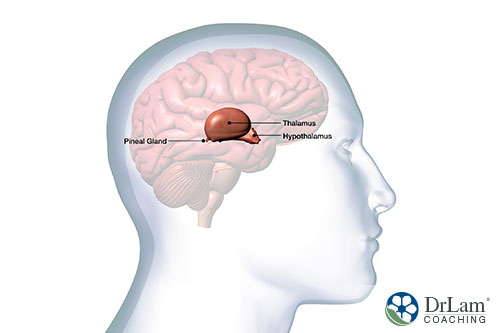 There is much in the news these days about all the positive effects of cannabidiol (CBD) oil on our general health and wellbeing. These benefits are usually cited as anything from inflammation control to addressing anxiety. However, not much is said about CBD oil’s effect on hormones, or how it impacts your endocrine system, the glands throughout your body that produce hormones. These hormones play a very important role in just about all body processes, including hunger, sexuality, mood, and your heartbeat.
There is much in the news these days about all the positive effects of cannabidiol (CBD) oil on our general health and wellbeing. These benefits are usually cited as anything from inflammation control to addressing anxiety. However, not much is said about CBD oil’s effect on hormones, or how it impacts your endocrine system, the glands throughout your body that produce hormones. These hormones play a very important role in just about all body processes, including hunger, sexuality, mood, and your heartbeat.
While research is continuously being conducted on CBD oil’s effect on hormones, these are the benefits the research has found thus far.
In order to understand CBD oil’s effect on hormones, you first have to look at how the endocrine system and its various hormones function. The glands making up the endocrine system include the hypothalamus, pituitary, pineal, parathyroid, pancreas, adrenals, ovaries, and testes.
Proper hormone function has a major impact on numerous bodily processes. Amongst these are included your metabolism, reproduction and sexuality, mood, appetite, and even growth. Numerous studies indicate CBD oil’s effect on hormones is both wide-ranging and profound.
CBD oil is extracted from the cannabis Sativa plant. It contains more than 100 phytocannabinoids. These various compounds may, to a large extent, mirror your body’s own endocannabinoids.
Your endocannabinoid system is a neuromodulatory system - in it, certain physiological processes employ certain chemicals in the regulation of neurons. The neuromodulators that play a role in central nervous system function, for example, include norepinephrine, serotonin, dopamine, and acetylcholine. Different neuromodulators tend to have an effect on specific target areas.
Neuromodulators are not neurotransmitters, per se, but they fulfill a similar function.
The neuromodulatory system plays a role in your body’s response to internal and external factors, synaptic plasticity, and the development of your central nervous system. Your endocannabinoid system is made up of enzymes that synthesize and degrade endocannabinoids, enzymes, and various cannabinoid receptors.
Much research has thus far been done on the effect of CBD oil and its impact on our bodies, including our mechanical, physical, biochemical functions, and psychological functions.
Two phytocannabinoids in CBD oil that have undergone much research are tetrahydrocannabinol (THC) and cannabidiol (CBD). Most marijuana users are familiar with a high that is the result of the THC. CBD, however, has no intoxicating effect on your body.
The CBD oil reacts with CB1 and CB2, cannabinoid receptors found in your brain and body. They are responsible for a number of physiological actions including inflammation, pain, and mood. When these different receptors are activated, the CBD oil stimulates your endocrine glands’ function.
 The body’s cortisol is mainly produced in the adrenal glands. It is commonly referred to as the stress hormone because of its ability to manage the stress response. Your stress response is also known as the NeuroEndoMetabolic (NEM) Stress Response because many systems are affected. Your NEM is governed by the brain, or more specifically, the Hypothalamic-Pituitary-Adrenal (HPA) axis.
The body’s cortisol is mainly produced in the adrenal glands. It is commonly referred to as the stress hormone because of its ability to manage the stress response. Your stress response is also known as the NeuroEndoMetabolic (NEM) Stress Response because many systems are affected. Your NEM is governed by the brain, or more specifically, the Hypothalamic-Pituitary-Adrenal (HPA) axis.
When a threat is perceived, the hypothalamus sends chemical messengers signaling this threat to the pituitary gland which, in turn, sends its own chemical messengers to the adrenals. The result is a cascade of hormones issued throughout the body to deal with the situation.
Cortisol, the fight or flight hormone, plays a large role in your body’s ability to handle stress. An increase in cortisol production also causes a decrease in certain bodily functions while others may stop altogether. Your body prioritizes immediate survival. Once the situation causing the stress passes, cortisol production usually returns to normal, as do other processes that were affected.
Constant, high cortisol production is found when stress continues, such as when you have a lot of stress due to your job. This could have a huge impact on your health and result in numerous health issues. Amongst these are adrenal fatigue.
Amongst the various processes affected by higher cortisol production are included:
The anti-catabolic properties of CBD oil may help with cortisol production regulation. In this way, it may help to reduce stress and mitigate the effects of cortisol on your body.
Insulin is produced in your pancreas. An insulin imbalance may result in heart issues, obesity, and diabetes.
Insulin plays a role in turning glucose into the energy your body needs in order to function correctly. It also plays a role in storing excess energy, i.e. glucose, in your fat cells and helps with nutrient absorption. When your body’s insulin production is compromised, and not enough is produced, blood sugar levels may rise. This could result in damage to your nerves, your blood vessels, and your organs.
Diabetes may be the result of inflammation in the pancreas and a reduction in insulin production. CBD oil may have a beneficial, anti-inflammatory effect which may be of aid for pancreatitis, i.e. inflammation of the pancreas. By reducing pancreatic inflammation, CBD oil may thus have a beneficial effect on the production of the hormone insulin. CB1 receptors have been found at the sites of insulin production.
The thyroid gland takes iodine from food and converts it into thyroid hormones thyroxine and triiodothyronine. The thyroid is the only organ in your body that can absorb iodine. Every cell in your body depends on thyroid hormones because they control metabolism at a cellular level. In other words, thyroid hormones are needed to convert oxygen and calories into energy so that your body can work at an optimal level.
An imbalance in thyroid hormones resulting from a compromised thyroid may result in hypothyroidism or hyperthyroidism which may lead to a number of health conditions. Your endocannabinoid system has a strong influence on thyroid function and thus the production of thyroid hormones.
Research indicates the presence of cannabinoid receptors on the thyroid gland and that CB1 receptors control thyroid hormone release. Studies on CBD oil have found that it plays a role in thyroid hormone production. In addition, CBD oil may benefit those with both benign and malignant thyroid lesions.
Interestingly, the pituitary gland has endocannabinoid receptors and is responsible for the sending of chemical messengers to the thyroid. It thus seems that CBD could communicate with this gland as well. It could potentially play a beneficial role in thyroid function and hormone production.
CBD oil's effect on hormones could help improve your sleep cycle and sleep quality. Sleep issues are often the result of unbalanced hormones.
 The pineal gland in your brain has cannabinoid receptors and is responsible for the production of melatonin. Melatonin regulates your circadian rhythm and your sleep-wake cycle. Your circadian rhythm, to a large extent, helps regulate many bodily functions. Obesity, diabetes, and depression are linked to low melatonin production. By activating the CB1 receptors in the pineal gland, CBD oil may help improve your sleeping habits.
The pineal gland in your brain has cannabinoid receptors and is responsible for the production of melatonin. Melatonin regulates your circadian rhythm and your sleep-wake cycle. Your circadian rhythm, to a large extent, helps regulate many bodily functions. Obesity, diabetes, and depression are linked to low melatonin production. By activating the CB1 receptors in the pineal gland, CBD oil may help improve your sleeping habits.
As previously mentioned, CBD may also help manage your adrenal glands’ cortisol production. Higher levels of cortisol in your body may keep you in a state of readiness, alertness, and anxiousness. By helping to manage cortisol production, and effectively lowering its production into a normal range, CBD oil may improve sleep.
Women are not strangers to shifts in their hormone levels. They usually have temporary hormone imbalances during puberty, while menstruating, and during menopause. These hormone imbalances are commonly associated with a number of symptoms such as sleep issues, increased stress, weight gain, and pain due to cramps. CBD oil’s effect on hormones may help manage most of these issues.
While CBD oil is known for its pain relief properties, it also has anti-inflammatory properties that may help with the cramps and pain felt during menstruation. This may also make it beneficial for premenstrual syndrome, or PMS.
Furthermore, CBD oil helps manage your body’s cortisol levels. This means it may be able to significantly reduce your feelings of anxiety during times of hormonal upheaval, while its insulin and melatonin regulating abilities may help prevent loss of sleep and weight gain that often happen during these times.
Stress is one of the main causes of anxiety and depression. It is also linked to adrenal fatigue and its numerous biological and psychological health implications. Amongst these are included irritable bowel syndrome, headaches, insomnia, stomach aches, weight loss or weight gain, heart problems, and various chronic ailments. Many of these conditions are marked by the presence of inflammation.
Besides its anti-inflammatory properties, CBD oil’s effect on hormones may be beneficial to brain health due to positive interaction with the brain’s serotonin receptors.
Serotonin is mainly found in the brain, blood, and bowels and is a neurotransmitter that is believed to help in smooth muscle constriction. It is the hormone that is associated with feelings of happiness and wellbeing. It is also the precursor hormone of melatonin, the hormone responsible for circadian rhythm regulation.
With regards to CBD oil’s effect on hormones and dopamine, more studies may be needed. What is known, however, is that CBD oil may have a partial action on dopamine D2 receptors, which could account for its positive actions on certain psychological issues.
Thus far, the CBD oil’s effect on hormones may help reduce feelings of anxiety, mild depression, the effects of post-traumatic stress disorder, autism symptoms, psychosis, and even Alzheimer’s.
 There are too many studies that show positive results with regards to CBD oil’s effect on hormones for one to make it out as a myth hatched up by those propagating cannabis use. Due to our natural endocannabinoid receptors binding so readily with the phytocannabinoids present in CBD oil, one could almost describe this as a product that works in harmony with our own bodies.
There are too many studies that show positive results with regards to CBD oil’s effect on hormones for one to make it out as a myth hatched up by those propagating cannabis use. Due to our natural endocannabinoid receptors binding so readily with the phytocannabinoids present in CBD oil, one could almost describe this as a product that works in harmony with our own bodies.
However, please consult your healthcare practitioner before you start using CBD oil as a supplement. CBD oil may have an interaction with medications you may currently be using. It could also have an effect on certain health issues. Your healthcare practitioner may also need to adjust your dosage of certain medications for chronic conditions. CBD may also put a strain on your liver, so if you have liver congestion it might worsen your symptoms.
Generally speaking, when starting out with CBD oil you usually start out at a relatively low dosage, slowly working your way up to the recommended dosage. This is because your body takes time to adjust to the oil, with the oil working optimally once your highest recommended dosage is reached.
There are many factors connected to diabetes. Insulin production is one of these. Research shows that CBD oil’s effect on hormones may help mitigate insulin production. In doing so, it may thus help address the high sugar levels that are associated with diabetes.
